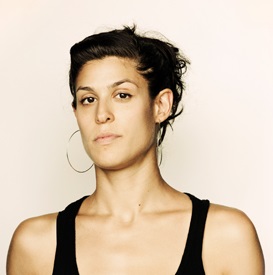Rapper Dessa Talks Atheism, Social Justice Humanism of Hip-Hop, pt. 2

If the era of hip-hop can sometimes be faulted for reinvigorating the trend of musical proselytizing, with no shortage of millionaire musicians dropping the names of their saviors and prophets into hit songs and crediting all their success to a higher power, there is another side of the story that deserves attention.
“Though hip-hop does have strong religious tendencies, hip-hop also, somewhat unsurprisingly, has really strong tendencies towards social justice,” says Dessa, a Minneapolis-based MC with a wealth of melodic and vital music under her belt. “Most of the rappers that I work with probably deserve a ‘slash’ in their titles, where it ends up being ‘rapper-slash-activist.’”
Dessa, a “vocal atheist” and increasingly prominent musical feminist, has long been an advocate for the positive and humanistic influences of her genre of choice. While she maintains that her activism and her music are separate activities (“It can sound very presumptuous, I think, to give a lot of unsolicited advice in lyrical form,” she says), she’s nonetheless an important, rising voice in the hip-hop landscape.
Speaking at the Nobel Peace Prize Forum last year, Dessa gave an impassioned presentation on the social history of rap music.
“I did a presentation on hip-hop and its record as a tool for social change, both for community building and for some pretty regressive ideas about gay people and women,” she explains. “So I think [the question] ‘Is hip-hop a force for good or bad?’ is usually answered best with a ‘Yes.’”
On her new album Parts of Speech, out this week, Dessa continues her poetic, often very personal explorations of life and her environment.
“I try to make the best music that I can that tells true stories and trust that if there were any deeper truth to be found in them, a listener will find it. … And then I don’t have to tell people ‘I’m human too,’ because I hope that will be evidenced in the depth and breadth of my experiences.”
Raised Catholic, Dessa went through a gradual transition to atheism when she was in her early teens. As an adult, she’s found an eagerness for promoting non-believers and their issues whenever she can. The first step, in her view, is getting skeptics to stop hiding.
“I think it’s important for atheists to come out and say that we’re atheists, because otherwise we’ll always be dogged by this public impression that we’re all absinthe-drinking radicals who really operate in a profligate, self-interested way. And I think that the more images that we have of warm, kind atheists who find meaning in their lives and try hard to be good to other people, the better that will be.”
For now, the best thing for humanists and other non-believers to do is be honest.
“There’s no need to print up t-shirts or anything. I’m not recruiting, per se,” Dessa says. “But I think answering the question honestly when it comes up is enough.”
As for hip-hop, tides may be starting to turn. With talented and socially conscious artists like Dessa, who aren’t driven to punctuate their musical successes with the alienating language of religious dogma, humanists can find surer footing on their trek to carve out a place in the hip-hop community. For her, it’s natural.
“I think as I’ve grown older, I’ve just grown more comfortable in my own skin,” she says. “I know it’s a surprise to people when I say I’m an atheist, I know it’s a disappointment to some people, but I think I’m just more comfortable owning it. And it’s a part of my life and my outlook that I’m excited about. I like being an atheist. I think it’s kind of awesome.”
Dessa’s new album, Parts of Speech, is now in stores and available online.
